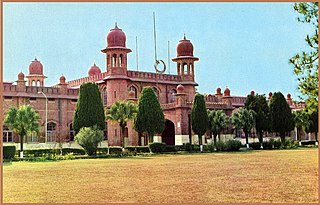Related Research Articles

A census is the procedure of systematically acquiring, recording and calculating population information about the members of a given population. This term is used mostly in connection with national population and housing censuses; other common censuses include censuses of agriculture, traditional culture, business, supplies, and traffic censuses. The United Nations (UN) defines the essential features of population and housing censuses as "individual enumeration, universality within a defined territory, simultaneity and defined periodicity", and recommends that population censuses be taken at least every ten years. UN recommendations also cover census topics to be collected, official definitions, classifications and other useful information to co-ordinate international practices.

Faisalabad District is one of the districts of Punjab province, Pakistan. According to the 1998 census of Pakistan it had a population of 3,029,547 of which almost 42% were in Faisalabad City. It is the third largest city of Pakistan after Karachi and Lahore.

Telenor Pakistan (Pvt.) Limited is the second largest cellular & digital services provider in Pakistan owned by Telenor Group, which is an international provider of voice, data, content and mobile communication services in 9 markets worldwide in Scandinavia and Asia. Telenor started out as a public company in 1855. Irfan Wahab Khan is the current CEO of Telenor Pakistan since August 2016.
Statistics Canada conducts a national census of population and census of agriculture every five years and releases the data with a two-year lag.
Lodhran, is a city and the capital of Lodhran District in the Punjab province of Pakistan. It is Pakistan's 81st largest city. It is located on the northern side of River Sutlej. Lodhran is famous for its cotton crop and mangoes.
The Census in Pakistan, is a decennial census and a descriptive count of Pakistan's population on Census Day, and of their dwellings, conducted and supervised by the Pakistan Bureau of Statistics. The 2017 Census in Pakistan marks the first census to take place in Pakistan since 1998. The next census will take place in March 2023

Most of the 25-30 million followers of Sikhism, the world's fifth-largest religion, live in the northern Indian state of Punjab, the only Sikh-majority administrative division on Earth, but Sikh communities exist on every inhabited continent. Sizeable Sikh populations in countries across the world exist in India (21,668,524), Canada (771,790), England (520,092), the United States (~269,986), and Australia (210,400), while countries with the largest proportions of Sikhs include Canada (2.12%), India (1.56%), Cyprus (1.1%) and England (0.92%), New Zealand (0.87%), and Australia (0.83%).

Kabal is a town in Swat District, Khyber-Pakhtunkhwa province of Pakistan located 10 kilometres (6 mi) from Mingora city. The old name of kabal was Chendakhwara. It is the tenth largest city in Khyber Pakhtunkhwa and 82nd largest in Pakistan by population.
In mass communication, media are the communication outlets or tools used to store and deliver information or data. The term refers to components of the mass media communications industry, such as print media, publishing, the news media, photography, cinema, broadcasting, digital media, and advertising.
Information technology in Pakistan is a growing industry that has the potential to expand more in the future. Matters relating to the IT industry are overseen by the Ministry of Information Technology of the Government of Pakistan. The IT industry is regarded as a successful sector of Pakistan economically, even during financial crisis. The first IT policy and implementation strategy was approved under the leadership of Atta-ur-Rahman, the Federal Minister of Science and Technology in August 2000 which laid the foundations of the development of this sector. The emphasis was placed on quality IT education in universities rather than numbers during this period. The quality measures introduced by Atta-ur-Rahman as Chairman of Higher Education Commission during 2002-2008 included:1) All PhD thesis were evaluated by eminent foreign scientists,2) All PhD thesis and research papers were checked for plagiarism 3) Some 11,000 students were sent abroad to leading universities for PhD level training and absorbed on their return, 4) Appointments at faculty positions were linked to international stature of the applicants as judged from their international publications, patents and citations, and (5) Quality Enhancement Cells were established in all universities for the first time in the history of the country. Thereafter two policies were launched by the Ministry of IT under the leadership of Anusha Rahman Khan, Federal Minister for IT and Telecom (2013-2018). The Telecom Policy was announced in December 2015, and later National Digital Pakistan Policy that was approved by the cabinet in May 2018. In 2001, a 15 year tax holiday was approved to promote the IT industry which has the grown from $30 million to over $3 billion during the last 16 years. A nationwide programme to train teachers was initiated by Intel in March 2002 in Pakistan on the request of Atta-ur-Rahman which has resulted in the training of 220,000 teachers across 70 districts at no cost to the government. The government of Pakistan has given incentives to IT investors in the country during the last decade, this resulted in the development of the IT sector. From 2003 to 2005, the country's IT exports saw a rise of about fifty percent and amounted a total of about 48.5 million USD. The World Economic Forum, assessing the development of Information and Communication Technology in the country ranked Pakistan 111th among 144 countries in the Global Information Technology report of 2014. In an analysis of scientific research productivity of Pakistan, in comparison to Brazil, Russia, India and China, Thomson Reuters has applauded the developments that have taken place as a result of the reforms introduced by Atta-ur-Rahman, since Pakistan has emerged as the country with the highest increase in the percentage of highly cited papers in comparison to the "BRIC" countries. Atta-ur-Rahman is Co-Chairman of the Prime Ministers Task Force on Information Technology and Telecommunications. As a result of the measures introduced on the recommendation of the Task Force, there has been a sharp increase in software exports of Pakistan.

Many countries and national censuses currently enumerate or have previously enumerated their populations by race, ethnicity, nationality, or a combination of these characteristics. Different countries have different classifications and census options for race and ethnicity/nationality which are not comparable with data from other countries. In addition, many of the race and ethnicity concepts that appear on national censuses worldwide have their origins in Europe or in the views of Europeans, rather than in the views of the locals of these countries.

This is a list of national population and housing censuses.

Anusha Rahman Ahmad Khan is a Pakistani politician who served as Federal Minister for Information Technology and Telecommunication, in Abbasi cabinet from April 2018 to May 2018. Previously she served as the Minister of State for Information Technology and Telecommunication of Pakistan from June 2013 to July 2017 in the third Sharif ministry and again from August 2017 to April 2018 in the Abbasi ministry. She had been a member of the National Assembly of Pakistan from 2008 to May 2018 representing the Pakistan Muslim League (N).

Charbagh is an administrative subdivision (tehsil) of Swat District in the Khyber Pakhtunkhwa province of Pakistan.

Pakistan Mobile Communications Limited, doing business as Jazz, is a Pakistani mobile network and internet services provider formed by the merger of Mobilink and Warid Pakistan.

The 2017 Census of Pakistan was a detailed enumeration of the Pakistani population which began on 15 March 2017 and ended on 25 May 2017. It was the first census taken in the country in the 21st century, nineteen years after the previous one in 1998, and it was carried out by the Pakistan Bureau of Statistics.

National Incubation Center, is a Pakistan-based startup incubation program under a public-private partnership with the Ministry of Information Technology and Telecommunication (MoTT), and other entities in Pakistan including the Ignite National Technology Fund.
The Pakistan Citizen's Portal (PCP) is a nation-wide grievance management platform initially launched as a government-owned mobile application for the citizens of Pakistan through which they can lodge their complaints with the government.
The 2023 Census of Pakistan is currently an ongoing detailed enumeration of the Pakistani population that will be the seventh national census in the country. It is to be held from 1 March 2023 to 1 April 2023 and will be conducted by the Pakistan Bureau of Statistics. Detailed results of the census would be announced on 30 April 2023.
The process of caste-based survey started in Bihar from January 7, 2023. The responsibility of conducting this survey in Bihar has been entrusted to the General Administration Department (GAD) of the government. The Government of Bihar is planning to collect data of every family digitally through a Mobile phone app. BELTRON, a Government of Bihar agency providing IT support, hired the services of a Maharashtra-based private firm to develop the mobile app, which will soon be available on Google Play. It will host the data on cloud. Necessary training has already been given to the people involved in this survey. GAD of Bihar has prepared a blueprint for the caste census survey. This census will be done in two phases. There are as many as 204 castes on Bihar government list. According to the list, 22 are to be counted in Scheduled Castes, 32 in Scheduled Tribes, 30 in Backward Classes, 113 in Extremely Backward Classes and 7 in Upper Castes.
References
- ↑ Press of Pakistan, APP (20 Feb 2023). "Amin inaugurates "SELF ENUMERATION PORTAL" for digital census". Associated Press of Pakistan.
- ↑ "Field activities in connection with first-ever Digital Census start across country". www.radio.gov.pk. Retrieved 2023-03-02.
- ↑ news Desk (2023-02-21). "Self-enumeration portal launched, will remain open till March 3". Pakistan Observer. Retrieved 2023-03-02.
- ↑ "Self-numeration portal for digital census inaugurated". Daily Times. 2023-02-21. Retrieved 2023-03-02.
- ↑ Qureshi, Zubair (February 21, 2023). "Self-enumeration portal launched, will remain open till March 3". Pakistan Observer.
- ↑ Bhatti, Rizwan (2023-02-28). "SBP decides to convene emergent MPC meeting this week". Brecorder. Retrieved 2023-03-02.